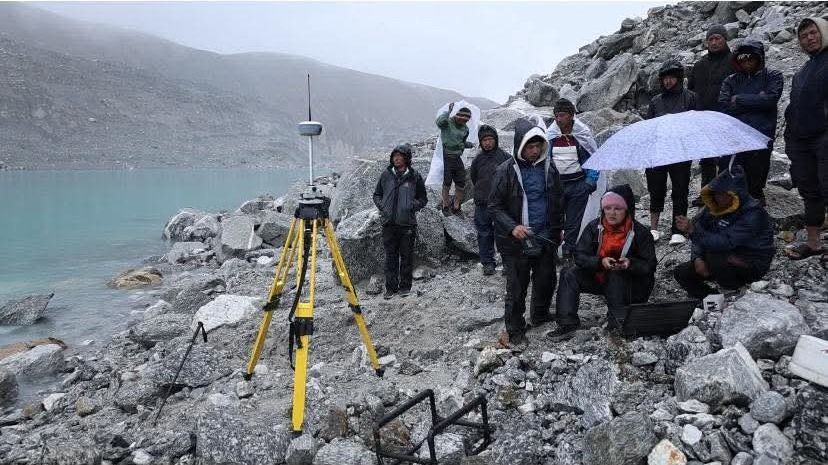Science
Historic Expedition Unveils First Insights into Sikkim’s Yulhe Kangse Lake

A significant scientific expedition has successfully explored Yulhe Kangse Lake, marking the first time this high-altitude glacial lake in North Sikkim has been surveyed. The mission, which began on August 20, 2025, involved a multi-departmental team comprised of various organizations, including the Sikkim Police, the Geological Survey of India (GSI), and the National Institute of Hydrology (NIH). The expedition concluded on September 6, 2025, with the team returning to Gangtok after gathering crucial data about this unique glacial environment.
The expedition team was divided into two groups. Team A focused on the Dolma Sampa and Sora funnel area, completing its objectives by August 26. Meanwhile, Team B ventured toward South Lhonak Lake, with sub-team B1 returning to Gangtok on August 29 after completing its assessments. Sub-team B2 continued towards Changsang before making its way back to Thangu on September 1.
On September 2, the team prepared to trek to Yulhe Kangse Lake, situated at an elevation of 16,378 feet. This expedition marked a milestone in the study of high-altitude Himalayan lakes, as it provided valuable baseline data regarding the lake’s depth profile, sediment composition, and its linkages to regional hydrology and climate change. The information gathered is expected to enhance understanding of fragile ecosystems in the Eastern Himalayas.
After arriving at Yulhe Kangse Base Camp on September 3, the team conducted a traditional puja ceremony before initiating the first bathymetric survey and sediment sampling on September 4. This process involved in-depth analysis to assess the lake’s characteristics and ecological health. They departed from the base camp on September 5, stopping at Lachung for a night halt, before concluding their expedition in Gangtok the following day.
The insights gained during this expedition are anticipated to provide new perspectives on the geomorphology and hydrology of high-altitude lakes. The mission was supported effectively by the Indo-Tibetan Border Police (ITBP), the Indian Army, and the local Zumsa community, whose cooperation was instrumental in ensuring the safety and success of this high-altitude scientific endeavor.
Through this groundbreaking exploration, researchers hope to contribute significantly to the ongoing study of climate interactions and environmental changes in the Himalayan region, offering a deeper understanding of these sensitive ecosystems.
-

 World5 months ago
World5 months agoSBI Announces QIP Floor Price at ₹811.05 Per Share
-

 Lifestyle5 months ago
Lifestyle5 months agoCept Unveils ₹3.1 Crore Urban Mobility Plan for Sustainable Growth
-

 Science4 months ago
Science4 months agoNew Blood Group Discovered in South Indian Woman at Rotary Centre
-

 World5 months ago
World5 months agoTorrential Rains Cause Flash Flooding in New York and New Jersey
-

 Top Stories5 months ago
Top Stories5 months agoKonkani Cultural Organisation to Host Pearl Jubilee in Abu Dhabi
-

 Sports4 months ago
Sports4 months agoBroad Advocates for Bowling Change Ahead of Final Test Against India
-

 Science5 months ago
Science5 months agoNothing Headphone 1 Review: A Bold Contender in Audio Design
-

 Top Stories5 months ago
Top Stories5 months agoAir India Crash Investigation Highlights Boeing Fuel Switch Concerns
-

 Business5 months ago
Business5 months agoIndian Stock Market Rebounds: Sensex and Nifty Rise After Four-Day Decline
-

 Sports4 months ago
Sports4 months agoCristian Totti Retires at 19: Pressure of Fame Takes Toll
-

 Politics5 months ago
Politics5 months agoAbandoned Doberman Finds New Home After Journey to Prague
-

 Top Stories5 months ago
Top Stories5 months agoPatna Bank Manager Abhishek Varun Found Dead in Well









